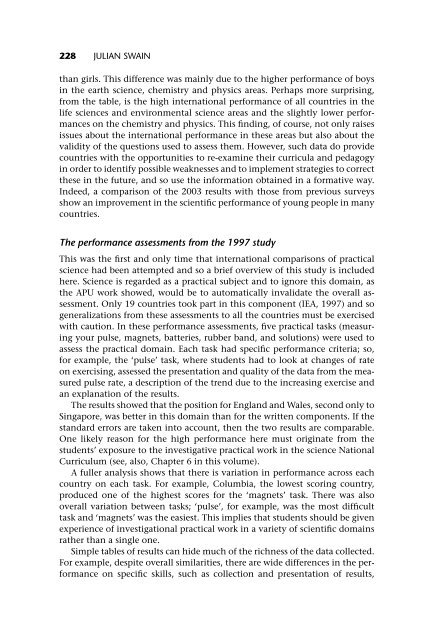good-practice-in-science-teaching-what-research-has-to-say
good-practice-in-science-teaching-what-research-has-to-say
good-practice-in-science-teaching-what-research-has-to-say
You also want an ePaper? Increase the reach of your titles
YUMPU automatically turns print PDFs into web optimized ePapers that Google loves.
228 JULIAN SWAIN<br />
than girls. This difference was ma<strong>in</strong>ly due <strong>to</strong> the higher performance of boys<br />
<strong>in</strong> the earth <strong>science</strong>, chemistry and physics areas. Perhaps more surpris<strong>in</strong>g,<br />
from the table, is the high <strong>in</strong>ternational performance of all countries <strong>in</strong> the<br />
life <strong>science</strong>s and environmental <strong>science</strong> areas and the slightly lower performances<br />
on the chemistry and physics. This f<strong>in</strong>d<strong>in</strong>g, of course, not only raises<br />
issues about the <strong>in</strong>ternational performance <strong>in</strong> these areas but also about the<br />
validity of the questions used <strong>to</strong> assess them. However, such data do provide<br />
countries with the opportunities <strong>to</strong> re-exam<strong>in</strong>e their curricula and pedagogy<br />
<strong>in</strong> order <strong>to</strong> identify possible weaknesses and <strong>to</strong> implement strategies <strong>to</strong> correct<br />
these <strong>in</strong> the future, and so use the <strong>in</strong>formation obta<strong>in</strong>ed <strong>in</strong> a formative way.<br />
Indeed, a comparison of the 2003 results with those from previous surveys<br />
show an improvement <strong>in</strong> the scientific performance of young people <strong>in</strong> many<br />
countries.<br />
The performance assessments from the 1997 study<br />
This was the first and only time that <strong>in</strong>ternational comparisons of practical<br />
<strong>science</strong> had been attempted and so a brief overview of this study is <strong>in</strong>cluded<br />
here. Science is regarded as a practical subject and <strong>to</strong> ignore this doma<strong>in</strong>, as<br />
the APU work showed, would be <strong>to</strong> au<strong>to</strong>matically <strong>in</strong>validate the overall assessment.<br />
Only 19 countries <strong>to</strong>ok part <strong>in</strong> this component (IEA, 1997) and so<br />
generalizations from these assessments <strong>to</strong> all the countries must be exercised<br />
with caution. In these performance assessments, five practical tasks (measur<strong>in</strong>g<br />
your pulse, magnets, batteries, rubber band, and solutions) were used <strong>to</strong><br />
assess the practical doma<strong>in</strong>. Each task had specific performance criteria; so,<br />
for example, the ‘pulse’ task, where students had <strong>to</strong> look at changes of rate<br />
on exercis<strong>in</strong>g, assessed the presentation and quality of the data from the measured<br />
pulse rate, a description of the trend due <strong>to</strong> the <strong>in</strong>creas<strong>in</strong>g exercise and<br />
an explanation of the results.<br />
The results showed that the position for England and Wales, second only <strong>to</strong><br />
S<strong>in</strong>gapore, was better <strong>in</strong> this doma<strong>in</strong> than for the written components. If the<br />
standard errors are taken <strong>in</strong><strong>to</strong> account, then the two results are comparable.<br />
One likely reason for the high performance here must orig<strong>in</strong>ate from the<br />
students’ exposure <strong>to</strong> the <strong>in</strong>vestigative practical work <strong>in</strong> the <strong>science</strong> National<br />
Curriculum (see, also, Chapter 6 <strong>in</strong> this volume).<br />
A fuller analysis shows that there is variation <strong>in</strong> performance across each<br />
country on each task. For example, Columbia, the lowest scor<strong>in</strong>g country,<br />
produced one of the highest scores for the ‘magnets’ task. There was also<br />
overall variation between tasks; ‘pulse’, for example, was the most difficult<br />
task and ‘magnets’ was the easiest. This implies that students should be given<br />
experience of <strong>in</strong>vestigational practical work <strong>in</strong> a variety of scientific doma<strong>in</strong>s<br />
rather than a s<strong>in</strong>gle one.<br />
Simple tables of results can hide much of the richness of the data collected.<br />
For example, despite overall similarities, there are wide differences <strong>in</strong> the performance<br />
on specific skills, such as collection and presentation of results,


